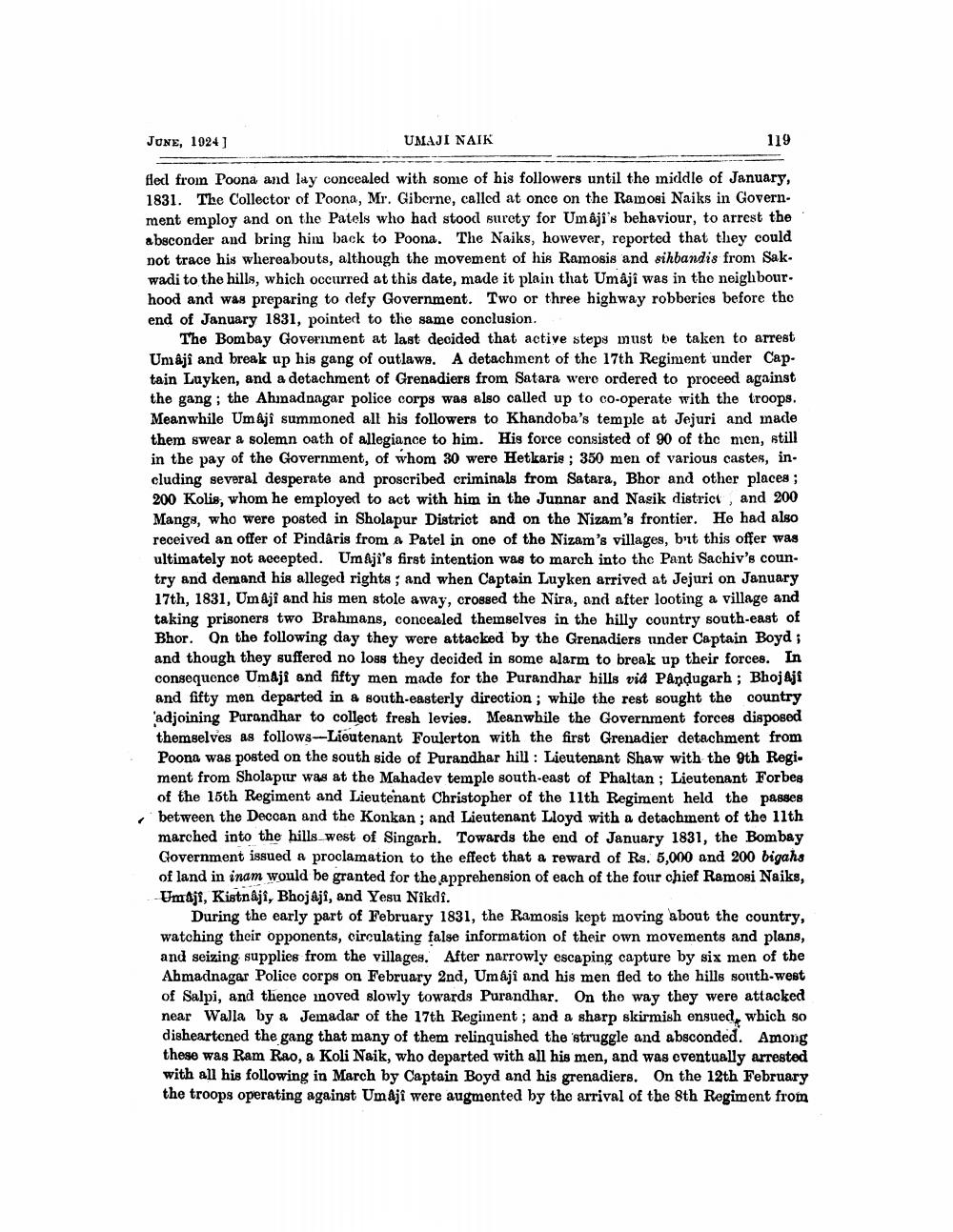________________
JONE, 1924)
UMAJI NAIK
119
fled from Poona and lay concealed with some of his followers until the middle of January, 1831. The Collector of Poona, Mr. Giberne, called at once on the Ramosi Naiks in Government employ and on the Patels who had stood surety for Umaji's behaviour, to arrest the absconder and bring him back to Poona. The Naiks, however, reported that they could not trace his whereabouts, although the movement of his Ramosis and sihbandis from Sakwadi to the hills, which occurred at this date, made it plain that Umaji was in the neighbour. hood and was preparing to defy Government. Two or three highway robberies before the end of January 1831, pointed to the same conclusion.
The Bombay Government at last decided that active steps must be taken to arrest Umáji and break up his gang of outlaws. A detachment of the 17th Regiment under Cap. tain Luyken, and a detachment of Grenadiers from Satara were ordered to proceed against the gang; the Ahinadnagar police corps was also called up to co-operate with the troops. Meanwhile Umaji summoned all his followers to Khandoba's temple at Jejuri and made them swear a solemn oath of allegiance to him. His force consisted of 90 of the men, still in the pay of the Government, of whom 30 were Hetkaris ; 350 men of various castes, including several desperate and proscribed criminals from Satara, Bhor and other places ; 200 Kolis, whom he employed to act with him in the Junnar and Nasik district, and 200 Mangs, who were posted in Sholapur District and on the Nizam's frontier. He had also received an offer of Pindaris from a Patel in one of the Nizam's villages, but this offer was ultimately not accepted. Umaji's first intention was to march into the Pant Sachiv's country and demand his alleged rights; and when Captain Luyken arrived at Jejuri on January 17th, 1831, Umáji and his men stole away, crossed the Nira, and after looting a village and taking prisoners two Brahmans, concealed themselves in the hilly country south-east of Bhor. On the following day they were attacked by the Grenadiers under Captain Boyd ; and though they suffered no logs they decided in some alarm to break up their forces. In consequence Umáji and fifty men made for the Purandhar hills vid Pandugarh ; Bhoj Aji and fifty men departed in a south-easterly direction; while the rest sought the country adjoining Purandhar to collect fresh levies. Meanwhile the Government forces disposed themselves as follows--Lieutenant Foulerton with the first Grenadier detachment from Poona was posted on the south side of Purandhar hill : Lieutenant Shaw with the 9th Regi. ment from Sholapur was at the Mahadev temple south-east of Phaltan; Lieutenant Forbes of the 15th Regiment and Lieutenant Christopher of the 11th Regiment held the passes between the Deccan and the Konkan; and Lieutenant Lloyd with a detachment of the 11th marched into the hills west of Singarh. Towards the end of January 1831, the Bombay Government issued a proclamation to the effect that a reward of Rs. 5,000 and 200 bigahs of land in inam would be granted for the apprehension of each of the four chief Ramosi Naiks, Um dji, Kistnají, Bhojaji, and Yesu Nikdi.
During the early part of February 1831, the Ramosis kept moving about the country, watching their opponents, circulating false information of their own movements and plans, and seizing supplies from the villages. After narrowly escaping capture by six men of the Ahmadnagar Police corps on February 2nd, Umaji and his men fled to the hills south-west of Salpi, and thence noved slowly towards Purandhar. On the way they were attacked near Walla by & Jemadar of the 17th Regiment; and a sharp skirmish ensued, which so disheartened the gang that many of them relinquished the 'struggle and absconded. Among these was Ram Rao, a Koli Naik, who departed with all his men, and was eventually arrested with all his following in March by Captain Boyd and his grenadiers. On the 12th February the troops operating against Um Aji were augmented by the arrival of the 8th Regiment from




